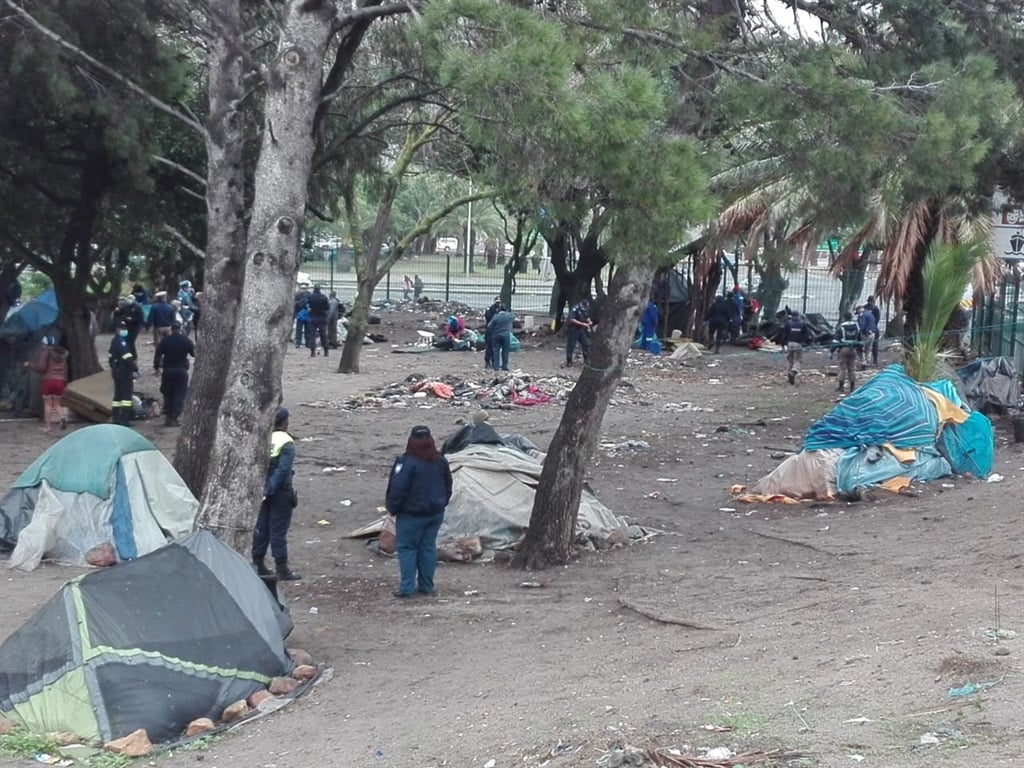
Across Cape Town, tents and makeshift homes are increasingly competing for the little open space left near the hustle and bustle of opportunities, writes Brett Herron.
Fifteen years ago, 18 July 2007, at the launch of The Elders, former President Nelson Mandela said these words about kindness:
"I believe that in the end, that it is kindness and accommodation that are all the catalysts for real change".
If we want to honour Madiba's values, leadership and contribution, as we should, we must demonstrate authentic empathy and compassion for others.
READ | Homeless fears forced removals amid claims of 'social cleansing' in the Mother City
Across the City of Cape Town, tents and makeshift homes are increasingly competing for the little open space left near the hustle and bustle of opportunities.
Life continues as normal
People settle in for the night in front of massive apartment blocks or on pieces of unoccupied land next to sprawling new developments, others choose the sidewalk of the new restaurant or grocer in the hopes of leftover food before bedtime.
At the same time, life goes on as normal for many, who simply walk around those on the streets or step over them if they happen to find themselves on the path of their morning walk or commute.
The rapidly expanding number of people living on the streets, in combination with woefully inappropriate and inept management of the phenomenon by local authorities, is a toxic brew that is steadily changing the face of the city.
Besides being of questionable constitutionality and morality, the City's focus on getting rid of homeless people by criminalising the basic necessities of life on the streets – such as cooking food outdoors, raising a few bucks by begging, or going to the loo – is clearly not working.
That the most active department in the City in its interface with homelessness has been Safety & Security is revealing. It reveals that homelessness is regarded more as a threat to safety than a housing and social justice issue.
Change in attitude
It's encouraging to see the apparent change in attitude recently expressed by the Mayor of Cape Town, Geordin Hill-Lewis, with a commitment to shift from the City's law enforcement approach to one of care and compassion.
While it's also encouraging to hear that the City intends on fast-tracking social housing projects, under the current definition of social housing in South Africa, we can not assume that this will in any way address street homelessness. This is because social housing is a specific type of public housing available to those who can reliably afford to pay rent.
The most pressing immediate need to respond to homelessness is suitable, properly managed and well-located accommodation.
But, while South Africa has real reason to boast about the number of fully subsidised homes it has built and given away free to qualifying citizens, there is still a mountain to climb – approximately 12 million South Africans still need homes.
Developing temporary shelters or transitional housing for homeless people – while availing to them the kinds of programmes and professional services that rebuild their confidence and ability to live off the streets – is the only viable solution.
People live on the streets for many reasons, including poverty, family break-ups, violence at home, prejudice, psychological illness or substance abuse. None of them set out in life with the ambition of ending up homeless. Who would choose to cast aside the most fundamental rights to human dignity? Who would choose a life of food insecurity, inhuman conditions and demonisation?
Growing numbers
In February 2022, the City's controversial Unlawful Occupation By-law, as well as amendments to the Streets, Public Places and Prevention of Noise Nuisances By-Law, were gazetted and given legal force. This was despite ongoing legal challenges by the Ndifuna Ukwazi Law Centre.
Furthermore, to deal effectively with the phenomenon of homelessness, one might expect the starting point to be knowing how many people actually live on the streets. This is not the case in Cape Town.
We know that there are approximately 2 500 shelter beds available in the city, but we don't know how many beds are actually needed, with the estimated number of people on the streets ranging from as low as 12 000 to as high as 50 000.
Prior to the Covid pandemic, in 2020, three non-profit organisations, U-Turn, Khulisa Streetscapes and MES, put the number at 14 357. There is no doubt the number of people living on the streets has grown exponentially since then.
Smarter investment
Local governments must treat not just the fact of homelessness but also the causes and develop pathways out of homelessness. Just as each individual's path into homelessness differs, so is the path out.
More investment in both facilities and personnel is required to fund rehabilitation centres, treatment of mental illness, assisted and senior living. And more effort must go into reuniting families in appropriate circumstances.
There are several vacant or under-used buildings owned by the City and other spheres of government that could be converted to accommodate homeless people - this process must be prioritised.
Money will have to be spent in the short to medium terms, but the value of dealing holistically with homelessness would be among the City's smarter investments in a sustainable future.
- Brett Herron, GOOD: Secretary-General & Member of Parliament.
Disclaimer: News24 encourages freedom of speech and the expression of diverse views. The views of columnists published on News24 are therefore their own and do not necessarily represent the views of News24.




 Publications
Publications
 Partners
Partners























